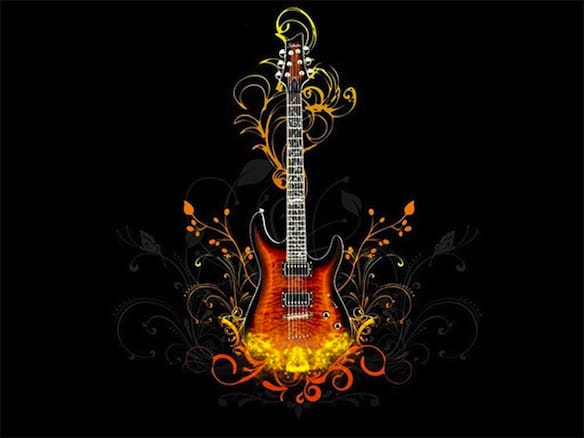
Image credit: Strait.
While Your Guitar Gently Sits, Waiting to Be Purchased
By Valerie Farabee
The warm sound and heady thrill of the electric guitar has invaded your body, mind, and soul, and you’re ready to grab an axe and start wailing, but where do you start?
As we learned from Priceonomic’s basic guide to guitars, an electric guitar is a guitar with a built in pickup or pickups that convert sound vibrations to electrical signals for amplification. But you know this already, and your fingers are itching to play those electrically amplified notes, so without further ado, here are the basics you should look for when buying an electric guitar. Electric guitars differ mostly according to their body-style, tonewoods, and their electronic components.
No Body’s Business But Your Own
Electric guitars come in three basic body styles:
Solid-body: Solid-body guitars, made of a single piece of wood or a combination of different pieces of wood, are the most common guitars on the market today. They are great for amplification and lots of effects. Choose a solid-body guitar if you’re into rock, blues, heavy metal or country.
Hollow-body: Hollow-body guitars, also known as jazz guitars, are basically acoustic guitars with an added pickup. These are great for quieter types of music – like jazz – that don’t require a lot of amplification and enjoy a softer tone.
Semi-hollow body: This is great for singer-songwriters who play primarily acoustic music but require amplification for performance reasons. These can generally be played at higher volume than hollow-body guitars without the feedback issues that come when hollow-bodies are amplified at too loud a volume.
What Wood The Neighbors Think?
The sound of an electric guitar comes solely from the interaction of the strings with the magnetic pickups, so why is wood important at all? The type of wood used in making the guitar determines how long the strings vibrate and the shape of their motion. A particularly resonant wood also allows the pickup to move, meaning that the combination of wood and the general construction of the guitar have a significant impact on tone.
The tonewood refers to the tone given by the type of wood used in making the guitar. To an advanced player, the tonewood matters a lot, but to those just getting into electric guitars, it’s just the chunk of wood that supports the pickups and hardware! The type of wood the body of your guitar is made of will definitely impact the quality of tone of your instrument.
The most common tonewoods for solid-body electric guitars are mahogany and maple. Mahogany made guitars offer a round, warm tone, while the stronger, denser maple wood produces a brighter tone. Ash is lighter weight and makes a ringing tone, and alder wood gives a great tonal balance and a full, beautiful sound. It is highly recommended that true aficionados do some specific research into the merits and drawbacks of each wood when adding to an instrument collection.
Pick Me Up at Noon
There are two basic types of pickups for electric guitars, and there are guitars available with any and all combinations of these pickups included. Remember, electric guitar pickups “pick up” the sound and carry it to the amplifier, so these little guys are important to your sound!
Single-Coil Pickup: A single-coil pickup, often used in the Fender line of guitars, produces a bright, twangy sound, but allows for more hum and feedback, making them difficult at higher volume levels. Good for funk, blues-rock, and country!
Humbucker Pickup: Though it sounds like something you might hear at a single’s bar, a humbucker pickup is just a double-coil pickup, but as such it provides a fatter, meatier tone than the single-coil. These are well associated with Gibson guitars and the hard rock sound that comes with them.
Accessorize, Accessorize, Accessorize
You need stuff when you buy an electric guitar. Be prepared for that. It’s the simple fact of being a musician and making art that you will eventually need to throw down for some much needed accessories.
Here’s a sample of what you might need in addition to the actual instrument: strings, amplifiers, picks, cables, cases, capos, straps and effects pedals. Wow! That’s a lot to think about! Ask a trusted salesperson to help you get outfitted with the essentials after you’ve decided on the type of guitar you’re buying, he or she will set you up!
The Price of an Artist’s Life
Electric guitars cost anywhere between $14 – $14,000. The higher end of the spectrum is going to be a distinctly custom made piece for the seriously talented career musician. Unless you are very special and very talented, it is not likely that you will be dropping $14k on a guitar.
Treat this guitar as an investment and buy the best you can afford. Higher quality guitars will keep their resale value and will last a lifetime with proper care. These days you can buy a guitar for around $450 that many advanced and professional players would be delighted to fool around with, and if you are considering performing at all, I recommend looking in this price range.
If you’re just noodling around at home and for your own edification, but you can hear the tonal difference in quality made guitars, you will definitely be able to get a solid deal on a good guitar from $125-$300. These aren’t the best, but with proper care will sound good and last for years!
Remember to do your research and compare price to value when buying an electric guitar, and you won’t be disappointed with what you find! Good luck!



